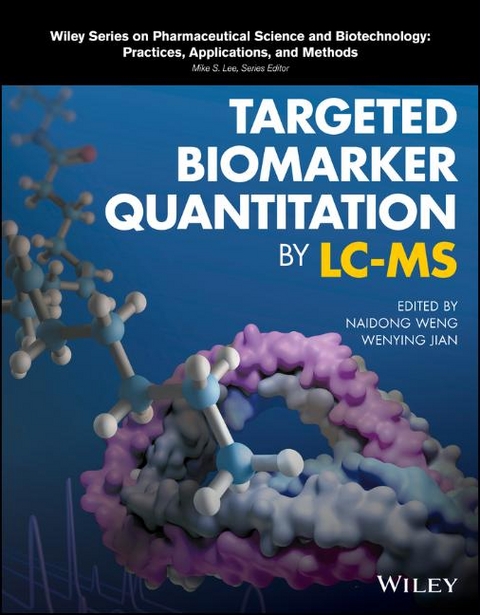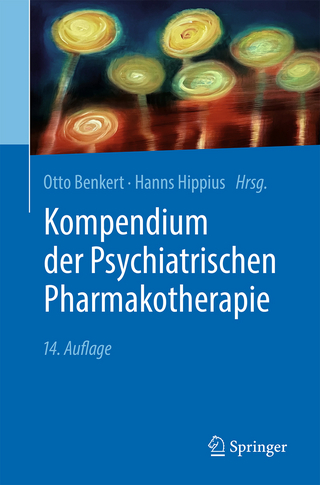
Targeted Biomarker Quantitation by LC-MS
John Wiley & Sons Inc (Verlag)
978-1-119-10306-6 (ISBN)
The first book to offer a blueprint for overcoming the challenges to successfully quantifying biomarkers in living organisms
The demand among scientists and clinicians for targeted quantitation experiments has experienced explosive growth in recent years. While there are a few books dedicated to bioanalysis and biomarkers in general, until now there were none devoted exclusively to addressing critical issues surrounding this area of intense research. Target Biomarker Quantitation by LC-MS provides a detailed blueprint for quantifying biomarkers in biological systems. It uses numerous real-world cases to exemplify key concepts, all of which were carefully selected and presented so as to allow the concepts they embody to be easily expanded to future applications, including new biomarker development.
Target Biomarker Quantitation by LC-MS primarily focuses on the assay establishment for biomarker quantitation—a critical issue rarely treated in depth. It offers comprehensive coverage of three core areas of biomarker assay establishment: the relationship between the measured biomarkers and their intended usage; contemporary regulatory requirements for biomarker assays (a thorough understanding of which is essential to producing a successful and defendable submission); and the technical challenges of analyzing biomarkers produced inside a living organism or cell.
Covers the theory of and applications for state-of-the-art mass spectrometry and chromatography and their applications in biomarker analysis
Features real-life examples illustrating the challenges involved in target biomarker quantitation and the innovative approaches which have been used to overcome those challenges
Addresses potential obstacles to obtain effective biomarker level and data interpretation, such as specificity establishment and sample collection
Outlines a tiered approach and fit-for-purpose assay protocol for target biomarker quantitation
Highlights the current state of the biomarker regulatory environment and protocol standards
Target Biomarker Quantitation by LC-MS is a valuable resource for bioanalytical scientists, drug metabolism and pharmacokinetics scientists, clinical scientists, analytical chemists, and others for whom biomarker quantitation is an important tool of the trade. It also functions as an excellent text for graduate courses in pharmaceutical, biochemistry and chemistry.
Naidong Weng, PhD, is Scientific Director, Janssen Fellow, and Head of Bioanalytical Chemistry and Pharmacokinetics within Department of Pharmacokinetics, Dynamics and Metabolism at US East Coast, Janssen Research & Development, Johnson and Johnson. He has over 25 years of experiences on quantitative bioanalysis. His research interest includes using HILIC-MS/MS for quantitation of highly polar analytes as well as chiral analysis. He has published more than 110 journal papers and book chapters. Wenying Jian, PhD, a Senior Principal Scientist of Bioanalytical Chemistry and Pharmacokinetics within Department of Pharmacokinetics, Dynamics and Metabolism at US East Coast, Janssen Research & Development, Johnson and Johnson. Her research experience and interest center on application of advanced LC-MS methodologies in detection, identification, and quantitation of endogenous molecules, drugs and their metabolites, including small and large molecules, and in complicated biological matrices. She has published more than 40 journal papers and book chapters.
List of Contributors xv
Preface xix
Abbreviations xxiii
Part I Overview 1
1 Overview of Targeted Quantitation of Biomarkers and Its Applications 3
Naidong Weng
1.1 Introduction 3
1.2 Biomarker Definition 4
1.3 Current Challenges of a Biomarker 5
1.4 Biomarker Validation Process 6
1.5 Current Regulatory Requirement for Target Biomarker Quantitation 6
1.6 Challenges of Biomarker Quantitation 7
1.7 Current Technologies for Biomarker Quantitation 8
1.8 Current Biomarker Quantitation Applications 9
1.9 Conclusion and Future Perspective 12
References 13
2 Translational Application of Biomarkers 17
Ray Bakhtiar
2.1 Introduction 17
2.2 Translational Medicine 17
2.3 Biomarkers 18
2.4 Biomarker Categories 18
2.5 Neurobiological Disorders 21
2.6 Cardiovascular Disorders 22
2.7 Chronic Obstructive Pulmonary Disease 23
2.8 Oncology 24
2.9 Biomarker Measurements and Regulatory Considerations 26
2.10 Conclusions 27
References 29
3 Current Regulatory Guidance Pertaining Biomarker Assay Establishment and Industrial Practice of Fit‐for‐Purpose and Tiered Approach 35
Naidong Weng
3.1 Introduction 35
3.2 Current Regulatory Guidance and Interpretation 36
3.3 Current Industrial Discussion and Recommendations 37
3.4 Considerations for Assay Validation and Sample Analysis 39
3.5 Examples of Fit‐for‐Purpose and Tiered Approach 41
3.6 Conclusion 42
References 42
4 Modern Liquid Chromatography and Mass Spectrometry for Targeted Biomarker Quantitation 45
Wenying Jian
4.1 Introduction 45
4.2 Liquid Chromatography 45
4.3 Mass Spectrometry 51
4.4 Summary and Future Perspectives 58
References 59
5 Comparison Between LC–MS and Ligand‐Binding Assay Approaches for Biomarker Quantification 65
QingQing Wang, Lili Guo, and Ian A. Blair
5.1 General Considerations: LBAs or LC–MS Assays 65
5.2 General Quantification Approaches 66
5.3 Analytical Issues Specifically Related to LBAs 67
5.4 Analytical Features Specifically Related to LC–MS Methods 68
5.5 Case Studies: Comparison Between ELISA and LC–MS 72
5.6 Summary and Future Perspective 74
References 74
6 Sample Preparation Methods for Targeted Biomarker Quantification by LC‐MS 79
Shichen Shen, Bo An, and Jun Qu
6.1 Introduction 79
6.2 Sample Preparation Strategies for Small Molecule Biomarkers 79
6.3 Sample Preparation Strategies for Macromolecule Biomarkers 86
6.4 Conclusive Remarks 94
References 95
7 Overcome the Endogenous Levels in Biomarker Quantitation Using LC–MS 107
Guowen Liu
7.1 Introduction 107
7.2 How Does Matrix Effect Affect Quantitation? 108
7.3 Commonly Used Strategies 109
7.4 Discussions and Future Perspectives 114
References 115
Part II Challenges and Approaches 119
8 Sample Collection for Targeted Biomarker Quantitation by LC–MS 121
Yuzhong Deng and Xiaorong Liang
8.1 Introduction 121
8.2 Timing of Biomarker Sample Collection 121
8.3 Matrix Type 122
8.4 Collection Methods 124
8.5 Sample Storage Stability 128
8.6 Summary 129
References 130
9 Nonspecific Binding in LC–MS Bioanalysis 137
Aimin Tan and John C. Fanaras
9.1 Introduction 137
9.2 Identification and Evaluation of NSB 137
9.3 Causes for NSB 140
9.4 Overcoming NSB Challenges 140
9.5 Conclusion 144
References 146
10 Strategies for Improving Sensitivity for Targeted Quantitation by LC–MS 149
Long Yuan and Qin C. Ji
10.1 Introduction 149
10.2 Sample Preparation Strategies for Improving Sensitivity 150
10.3 LC Separation Strategies for Improving Sensitivity 156
10.4 MS Detection Strategies for Improving Sensitivity 160
10.5 Conclusions 163
References 163
11 Strategies to Improve Specificity for Targeted Biomarker Quantitation by LC–MS 171
Yuan‐Qing Xia and Jeffrey D. Miller
11.1 Introduction 171
11.2 Differential Mobility Spectrometry 171
11.3 High‐Resolution Mass Spectrometry 175
11.4 Conclusions 180
References 180
12 Biomarker Quantitation Using Relative Approaches 183
Shane M. Lamos and Katrina E. Wiesner
12.1 Introduction 183
12.2 Relative Quantitation Isotope Labeling Approaches 183
12.3 Conclusions 191
References 192
Part III Applications 195
13 Targeted Quantification of Amino Acid Biomarkers Using LC‐MS 197
Barry R. Jones, Raymond F. Biondolillo, and John E. Buckholz
13.1 Introduction 197
13.2 Amino Acids as Biomarkers 198
13.3 Methods of Measurement 201
13.4 Accuracy, Precision, Selectivity, and Stability Considerations 203
13.5 Assay Design 207
13.6 Conclusion 207
References 208
14 Targeted Quantification of Peptide Biomarkers: A Case Study of Amyloid Peptides 211
Lieve Dillen, Marc De Meulder, and Tom Verhaeghe
14.1 Overview 211
14.2 Challenges and Approaches 212
14.3 Application to the Quantification of Alzheimer’s Disease Biomarkers 216
14.4 Conclusion 222
References 222
15 Targeted Protein Biomarker Quantitation by LC‐MS 227
Yongle Pang, Chuan Shi, and Wenying Jian
15.1 Introduction 227
15.2 Sample Preparation for Targeted Protein Biomarker Quantitation 231
15.3 “Bottom‐Up” Approach for Targeted Protein Biomarker Quantitation Using LC‐MS 233
15.4 “Top Down” Approach for Targeted Protein Biomarker Quantitation Using LC‐MS 235
15.5 Key Considerations in Targeted Protein Biomarker Quantitation Using LC‐MS 236
15.6 Summary and Future Perspectives 239
References 240
16 Glycoprotein Biomarkers 245
Shuwei Li, Stefani N. Thomas, and Shuang Yang
16.1 Introduction 245
16.2 Technologies for Glycoprotein Analysis 246
16.3 Glycoprotein Biomarker Quantification Using LC‐MS 255
16.4 Protein Biomarkers for Clinical Applications 259
16.5 Summary and Future Direction 264
References 265
17 Targeted Lipid Biomarker Quantitation Using Liquid Chromatography–Mass Spectrometry (LC–MS) 273
Ashkan Salamatipour, Ian A. Blair, and Clementina Mesaros
17.1 Introduction of Lipids 273
17.2 LC–MS Analysis of Lipids 276
17.3 Examples of LC–MS Analysis of Lipids 278
17.4 Summary and Future Directions 283
References 283
18 Targeted LC–MS Quantification of Androgens and Estrogens for Biomarker Development 289
Daniel Tamae
18.1 Introduction 289
18.2 Current Considerations in Biomarker Validation 292
18.3 Current Considerations in LC–MS Method Development 293
18.4 Clinical Application of LC–MS Quantification of Estrogens and Androgens 296
18.5 Conclusion and Perspective 301
References 301
19 Steroid Biomarkers 307
Mike (Qingtao) Huang, Shefali Patel, and Zhongping (John) Lin
19.1 Introduction 307
19.2 Sterols as Endogenous Biomarkers and Their Quantitation 307
19.3 Cortisol and 6 β‐Hydroxycortisol (6β‐HC) as Biomarkers and Their Quantitation 312
19.4 Summary 316
References 316
20 Bile Acids as Biomarkers 321
Clara John, Philipp Werner, Joerg Heeren, and Markus Fischer
20.1 Introduction 321
20.2 Analytical Platform for Bile Acids 323
20.3 Summary 327
References 327
21 Biomarkers for Vitamin Status and Deficiency: LC‐MS Based Approach 331
Stanley (Weihua) Zhang and Jonathan Crowther
21.1 Introduction to Vitamin and Vitamin Deficiency 331
21.2 Detection of Vitamin D by LC‐MS/MS and Comparison with Other Methods 332
21.3 Other Vitamin Biomarkers 338
21.4 Conclusions and Perspectives 340
References 341
22 Quantitation of Acyl‐Coenzyme A Thioesters as Metabolic Biomarkers 347
Nathaniel Snyder
22.1 Introduction 347
22.2 Structure and Function of Acyl‐CoAs 347
22.3 Detection and Quantitation of Acyl‐CoAs 349
22.4 Acyl‐CoA Analysis for Current Drug Targets 352
22.5 Acyl‐CoAs as Biomarkers in Metabolic Disease 352
22.6 The Involvement of Acyl‐CoAs in Drug Metabolism 353
References 353
23 Neurotransmitter Biomarkers 357
Guodong Zhang
23.1 Introduction 357
23.2 Chromatographic Platforms of Biological Measurement for Neurotransmitters 358
23.3 Bioanalytical Methodologies 359
23.4 Conclusion 367
References 367
24 Targeted Quantification of Carbohydrate Biomarkers Using LC–MS 371
Cong Wei and Hong Gao
24.1 Introduction 371
24.2 Overview 371
24.3 Bioanalytical Method Development for Carbohydrate Biomarkers 374
24.4 Conclusions 384
References 384
25 Nucleoside/Nucleotide Biomarkers 389
Guodong Zhang
25.1 Introduction 389
25.2 Chromatographic Platforms for Nucleosides/Nucleotides 390
25.3 Bioanalytical Methodologies 391
25.4 Nucleoside/Nucleotide Biomarkers and Case Studies 398
25.5 Conclusion 399
References 402
26 LC–MS of RNA Biomarkers 407
Michael G. Bartlett, Babak Basiri, and Ning li
26.1 Introduction 407
26.2 Role in Disease and Therapeutics 408
26.3 Role of Mass Spectrometry in RNA Biomarkers 409
26.4 LC–MS Approaches for RNA Determination 411
26.5 Case Studies 415
References 418
Index 425
| Erscheinungsdatum | 28.09.2017 |
|---|---|
| Reihe/Serie | Wiley Series on Pharmaceutical Science and Biotechnology: Practices, Applications and Methods |
| Verlagsort | New York |
| Sprache | englisch |
| Maße | 222 x 274 mm |
| Gewicht | 1315 g |
| Themenwelt | Medizin / Pharmazie ► Medizinische Fachgebiete ► Pharmakologie / Pharmakotherapie |
| Naturwissenschaften ► Biologie | |
| Naturwissenschaften ► Chemie | |
| ISBN-10 | 1-119-10306-1 / 1119103061 |
| ISBN-13 | 978-1-119-10306-6 / 9781119103066 |
| Zustand | Neuware |
| Informationen gemäß Produktsicherheitsverordnung (GPSR) | |
| Haben Sie eine Frage zum Produkt? |
aus dem Bereich


